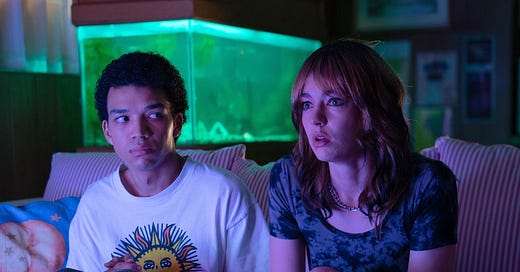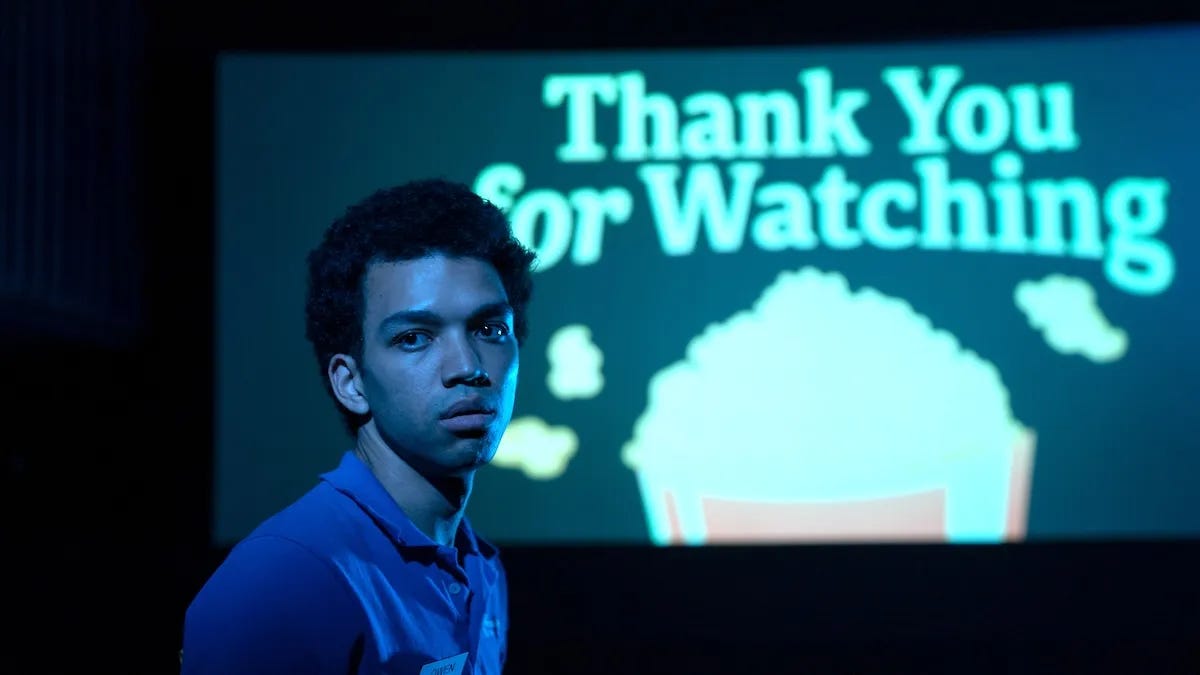'I Saw the TV Glow' review: The show must go on
Jane Schoenbrun's new film is a haunting portrait of closeted ‘90s suburbia
Time passed differently in the closet.
First, there was the itching feeling that something about me was off, or incomplete. Then, when the realization came that I was gay, the survival instinct kicked in. Another self starts living, and the real one is suffocated.
Every moment after the moment of realization was a kind of warped performance. Life can feel half-lived, a kind of quiet madness sets in. Years, or if you’re lucky, mere weeks, can slip away in an instant.
It never seems like the right time to come out, and then you’re not a kid anymore. You’re facing down the rest of your life, and you have a choice to make. Does the shell of a person continue performing, or has the time come to, uh, fetch the bolt cutters?
No two closets are the same, nor is the journey out of it. Sometimes there is no escape. Sometimes, when faced with an opportunity to kick open the door or slam it shut and lock it, the latter wins out. Darkness sets in.
The director Jane Schoenbrun understands this keenly. I left their new film, I Saw the TV Glow, stunned by its clarity of vision and command of form.
A haunting portrait of closeted ‘90s suburbia, TV Glow focuses on Owen (Justice Smith) and Maddy (Brigette Lundy-Paine), two high schoolers who bond over their shared desire to escape their respective adolescent hells through their television screens.
Their relationship is strictly platonic. Early on, when they’re talking on the high school bleachers, Maddy tells Owen she likes girls, and that he should give up if he’s pursuing her romantically. When she asks if he likes girls or boys, his deadpan reply is, “I like TV shows.”
The fictional show they both obsess over, The Pink Opaque, follows two young women (Helena Howard and Lindsey ‘Snail Mail’ Jordan) who form a psychic connection at summer camp, illustrated by matching pink ghosts on the back of their necks, and go on to tag team distinctly adolescent nightmares. (One of the creatures is a giant ice cream cone with a melting, disfigured face).
What begins as neon-tinged nostalgia for sleepovers in the age of ‘Monster of the Week’ shows descends into a devastating, frightening, and all-too-real depiction of repression. Owen and Maddy each see themselves as one of the show’s protagonists; there are recurring images of them staring blankly at the screen as if they are trying to fuse their consciousness with the characters’ own.
When they aren’t fixated on the TV screen, uneasiness and insecurity follow them everywhere.
“Isn’t that a show for girls?” Owen’s domineering father (Fred Durst) replies when his son asks to stay up late to watch The Pink Opaque.
Schoenbrun is not subtle about making this televisual obsession into a trans allegory. They take familiar aesthetics- from horror masters like Davids Cronenberg and Lynch to millennial TV staples like Power Rangers, Goosebumps, and Buffy- and mash them together into a deeply personal, haunting vision of dysphoria.
Schoenbrun says that their goal has been to take familiar pop cultural totems and make them their own through that lens.
“This has been a guiding force in my work since long before I even realized I was trans,” they said in a recent Film Comment interview. “I call it mutation—this desire to mutate the images and iconography that I have been fed all my life, and… transition them into a form that is almost like the ‘glow’ in my film: equal parts beautiful and grotesque.”
The Pink Opaque is canceled after ending on a season five cliffhanger: its two leads are buried alive by the nefarious main villain, Mr. Melancholy. This, combined with Maddy’s sudden disappearance, leaves Owen’s life in a suspended state.
Before this, TV Glow operated on a mostly straightforward progression through its characters’ youth. When they had the show to bond over, the screen is often overwhelmed by superimpositions that lay out episode titles and lore. But at the midpoint, Schoenbrun starts to fast-forward time at a deeply unsettling clip, and that juvenile excitement fades away. Now, Owen’s life is slipping through his fingers, and the movie is marked with a horrifying emptiness.
This relentless nothingness is hit home by Justice Smith’s gut-wrenching performance. As Owen narrates the mundane occurrences in his life, you can see the light leaving his eyes.
Then, after years stuck in a dead-end, monotonous job at a movie theater, Maddy reemerges. Their quiet, stunned reunion at an empty grocery store has seismic emotional weight. Even though we’ve been watching him the entire time, it’s as if Owen has returned, too.
Maddy takes Owen to a dive bar to explain where she’s been. Their conversation is intertwined with astonishing live music numbers from the movie’s expansive original soundtrack.
“I think I was born bored,” Sloppy Jane and Phoebe Bridgers sing during one of the performances at the bar. “I think I was born blue, I think I was born wanting more.”
Maddy, dressed in the same leather dyke aesthetic that a character in The Pink Opaque dons, is convinced she was sucked into the world of the show, that that was her actual life and her suburban high school existence was a Matrix-esque simulated reality. She tells Owen she’s returned to their hometown briefly to bring him with her.
This section of the movie climaxes with an astonishing monologue, shot almost entirely in close-up, that Maddy delivers in an inflatable dome at their old high school. Lundy-Paine is incredible in this scene, as Owen is given an ultimatum: join Maddy in the world of the television show, or stay behind.
Will he follow Maddy to this fantastic realm? Will his true self, buried alive at the end of season five, be excavated?
As Schoenbrun portrays it, this is not a choice that can be put off forever. Owen will either make it now or continue suffering in silence, as years melt into decades and he reaches a breaking point.
I found the precision of Schoenbrun’s storytelling in this stretch surprising and powerful. They use the trappings of horror to create a reality that is both fluid and stagnant. When the media you consume becomes your life, your life eventually becomes a rerun.
I Saw the TV Glow is now playing in select theaters. It has a wider release on May 17.






